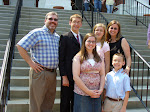
Monday, November 26, 2007
The Problem with Huckabee

Monday, November 12, 2007
Olasky on Christian Politics
Monday, November 5, 2007
Interesting Column
I'm still working on midterms. I promise I'll be back.
Friday, November 2, 2007
Interview with Dinesh D'Souza

Saturday, October 27, 2007
My Parents Are Here!

Monday, October 22, 2007
My Final Word on "A Common Word"

The "OHIO CURSE" Lives On
Good News: PITTSBURGH LOST ON THE LAST PLAY OF THEIR GAME AGAINST THE DENVER BRONCOS! I was watching both games simultaneously, and I was comforted by seeing Pittsburg walking off the field in stunned silence. That is always, always, a sweet feeling.
Wednesday, October 17, 2007
INDIANS 7 / RED SOX 3
Monday, October 15, 2007
Joel Osteen on 60 Minutes

The New (Old?) Face of Atheism
"He showed up drunk to an exclusive NY dinner club meeting (hosting by
David Horowitz), proceeded to make anti-Semitic remarks, insulted a member of
the club (a priest, who also happened to be a 9/11 hero), and had to be
physically restrained twice as he flew into rages aimed at said priest."
Read about it here, and here.
Sunday, October 14, 2007
Saturday, October 13, 2007
HOLLYWOOD'S TOP 12 CHRISTIANS?

Friday, October 12, 2007
Part III of "A Common Word"

Let me quote some portions of the letter and then make some observations and/or ask questions.
Under the first heading in Part III, the writers say:
Whilst Islam and Christianity are obviously different religions - and whilst there is no minimising some of the formal differences - it is clear that the Two Greatest Commandments are an area of common ground adn a link between the Qur'an the Torah and the New Testament.
What are these "formal differences?" The writers have made no reference to these, and I am curious as to what they think of the differences.
Immediately after this, the writers say the following:
What prefaces the Two Commandments in the Torah and the New Testament, and what they arise out of, is the Unity of God - that there is only one God....Thus the Unity of God, love of Him, and love of the neighbour form a common ground upon which Islam and Christianity (and Judaism) are founded (:13).
I am becoming concerned about this phrase "Unity of God," which occurs throughout the letter. What exactly is meant by this? I know Muslims have a very hard time with the concept of the Trinity. Is all this letter a failure to recognize this? Is all this really a call to reject Trinitarianism, a fundamental teaching of Christianity?
On page 14, the writers launch into a most strange invitation. They write:
"Muslims, Christians and Jews should be free to each follow what God commanded them, and not have 'to prostrate before kings and the like'; for God says elsewhere in the Holy Qur'an: Let there be no compulsion in religion....(Al-Baqarah, 2:256)."
This puzzles me. Muslims are inviting Christians not to use compulsion in religion? What is so strange about this is that this is almost the definition of religious practice in America! Does the same practice prevail in Iran? in Pakistan? in Saudi Arabia? Muslim nations all!
The writers also say this:
As Muslims, we say to Christians that we are not against them and that Islam is not against them -- so long as they do not wage war against Muslims on account of their religion, oppress them and drive them out of their homes...
I don't understand the issue here. Where in the world are Christians waging war against Muslims? Although there are many Christians in the United States, American is not an official Christian nation. They cannot be referring to the war in Iraq, can they? Even if American were Christian, the war is not being waged against Muslims on account of their religion, but on account of certain terrorist commitments. Clearly this acceptance quoted above is conditional, subject to much interpretation. I suspect the whole statement here is misleading.
Finally, the writers say this:
Together they [Christians and Muslims] make up more than 55% of the world's population, making the relationship between these two religious communities the most important factor in contributing to meaningful peace around the world. If Muslims and Christians are not at peace, the world cannot be at peace. With the terrible weaponry of the modern world; with Muslims and Christians intertwined everywhere as never before, no side can unilaterally win a conflict between more than half of the world's inhabitants. Thus our common future is at stake. The very survival of the world itself is perhaps at stake.
I find this curious for a couple of reasons. First, where is the all the war going on? Iraq is a small place, compared to the Islamic world in general, and besides, a secular government is at war with a group of terrorists. It is not Christians at war with Muslims; to claim otherwise is simply wrong. Second, the only place Muslims and Christians are intertwined is predominantly Christian nations. In Muslim nations, Christians find it hard to exist, let alone worship and thrive.
In my opinion, the bottom line is this: if Muslims are not willing to talk about the differences between Christianity and Islam, no dialogue can go forward. To try to smooth over the differences by highlighting some similarities is no way to move forward. This letter does not help the current state of discussion between Christians and Muslims.
Part II of "A Common Word"

"None of you has faith until you love for your neighbour what you love for yourself," says Muhammad.
Part I of "A Common Word"

"The best that I have said - myself, and the prophets that came before me -The letter then makes the following points:
is: 'there is no god but God, He Alone, He hath no associate, His is the
sovereignty and His is the praise and He hath power over all things."
Moreover, we also do know...that both formulas have another remarkable
parallel: the way they arise in a number of slightly differing versions and
forms in different contexts, all of which, nevertheless, emphasize the primacy
of total love and devotion to God.
That is to say, in other words, that the Prophet Muhammad was perhaps,
through inspiration, restating and alluding to the Bible's First
Commandment.













